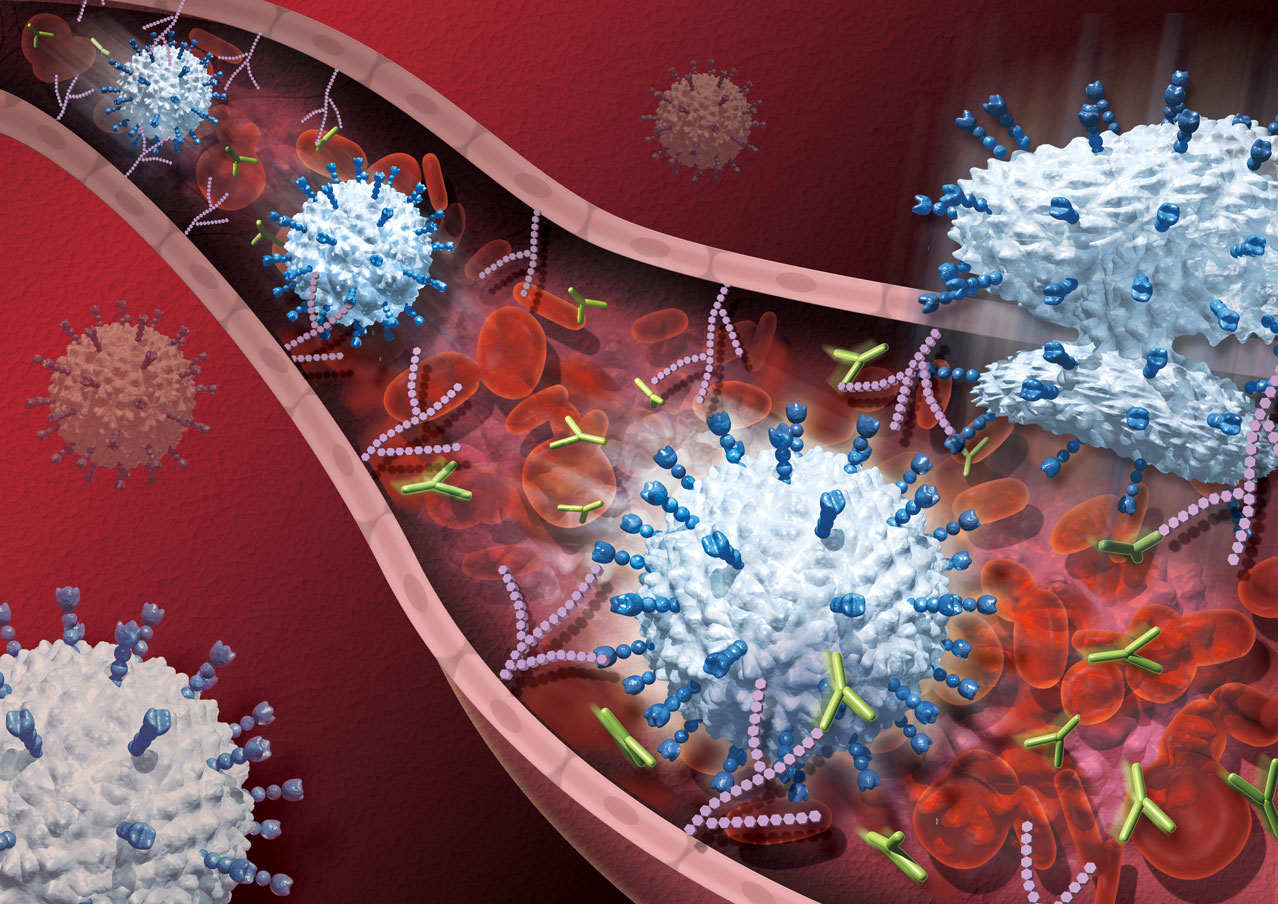GLYCOMEDICINE RESEARCH CENTER
SUGAR SCIENCE'S IMMUNOTHERAPHY PLAY
-By bridging the gap between glycoscience and medicine, major advances in immunology and drug development are imminent.
Research Keywords: Immunology, Biochemistry, Glycobiology
 © Akiko Sato
© Akiko SatoLymphocytes are the body’s warrior cells. They circulate through the bloodstream and arrive at sites in the body such as the spleen and lymph nodes, where they combat harmful bacteria, viruses and even cancer cells. Sugars, or glycans, are integral to this migratory process called lymphocyte homing, which is of intense interest to researchers. These scientists hope to target glycans to find new immunotherapies and drugs for autoimmune diseases.
“We now know that glycans — chains of sugar molecules that have diverse functions in our bodies — play an essential role in lymphocyte homing,” says Hiroto Kawashima, a professor at Chiba University’s Graduate School of Pharmaceutical Sciences, Laboratory of Microbiology and Immunology.
“These glycans are found on the surface of endothelial cells in lymph nodes,” he explains. “Thanks to glycans, lymphocytes recognize and bind to the surface of those cells.” Lymph nodes activate lymphocytes to fight disease.
In a study published in Nature Immunology in 2005, Kawashima and his colleagues in Japan and the United States showed that glycans produced by two enzymes — N-acetylglucosamine-6-O-sulfotransferase 1 (GlcNAc6ST-1) and GlcNAc6ST-2 — are essential for the binding of lymphocytes, and consequently play a vital role in controlling lymphocyte homing in mice.
After working on this study at California’s Burnham Institute, Kawashima returned to Japan in 2005, bringing with him the ‘knockout’ mice (deficient in the two key enzymes) he had developed. At Chiba he has used these to continue hunting for new antibodies that target glycans.
GLYCOMEDICINE TAKES OFF
Today, the expanding fields of glycoscience (the study of glycans) and glycomedicine (combining glycoscience and medicine) are leading to breakthroughs in drug development and diagnostics for autoimmune diseases.
Chiba University’s Glycomedicine Research Center, which opened in August 2017, marks a shift towards accelerating such breakthroughs in Japan.
“Many researchers here at Chiba University have been working independently on glycans,” Kawashima says. “Some specialize in biological functions, while others focus on synthesis or analyze glycan structures. The idea is to bring all of these researchers together, build new collaborations and understand the function of glycans across many biological phenomena.”
The new centre has plans to collaborate with teams both nationally, for example, at the Glycomedicine Technology Research Center and the National Institute of Advanced Industrial Science and Technology (AIST), and internationally.
Already, Kawashima has developed antibodies that will specifically bind to the building blocks of glycans and disable them in studies published in The Journal of Biological Chemistry in 2010 and 2015. This could halt the dysfunctions involved in autoimmune disease, in which the immune system is overreacting.
“Usually, it’s very difficult to generate monoclonal antibodies against carbohydrates,” says Kawashima. This difficulty in producing clones of these antibodies is because carbohydrate antigens are not generally very antigenic. “To get around this problem, we immunized knockout mice with cells expressing the missing sugar chains, which are highly prone to stimulating the production of antibodies.”
The next step will be to further investigate and identify new ideas for drug development and to collaborate with pharmaceutical companies to bring them to market.
“Right now, there are lots of antibody drugs,” says Kawashima. These immunotherapies target issues such as rheumatoid arthritis and cancer, but, he says, new advances are limited by a shortage of molecules to target. “Glycans have unexplored potential, so this is an exciting time to be looking into developing new candidate drugs based on glycoscience.”
(CHIBA RESEARCH 2020)Members
Principal Investigator
| Name | Title, Affiliation | Research Themes |
|---|---|---|
| KAWASHIMA Hiroto | Professor, Graduate School of Pharmaceutical Science | Immunology, Glycochemistry |
Co-Investigatior
| Name | Title, Affiliation | Research Themes |
|---|---|---|
| ITOH Motoyuki | Professor, Graduate School of Pharmaceutical Science | Molecular Biology, Cell Biology |
| DOHI Hirofumi | Associate Professor, Graduate School of Medicine | Sugar Chemistry |
| NISHIDA Noritaka | Professor,Graduate School of Pharmaceutical Science | Structual biology,NMR |
| YAMAGUCHI Noritaka | Associate Professor,Graduate School of Pharmaceutical Science | Pharmacology |
| MATSUMOTO Yasunori | Assistant Professor,Chiba University Hospital | Gastroenterological surgery |
